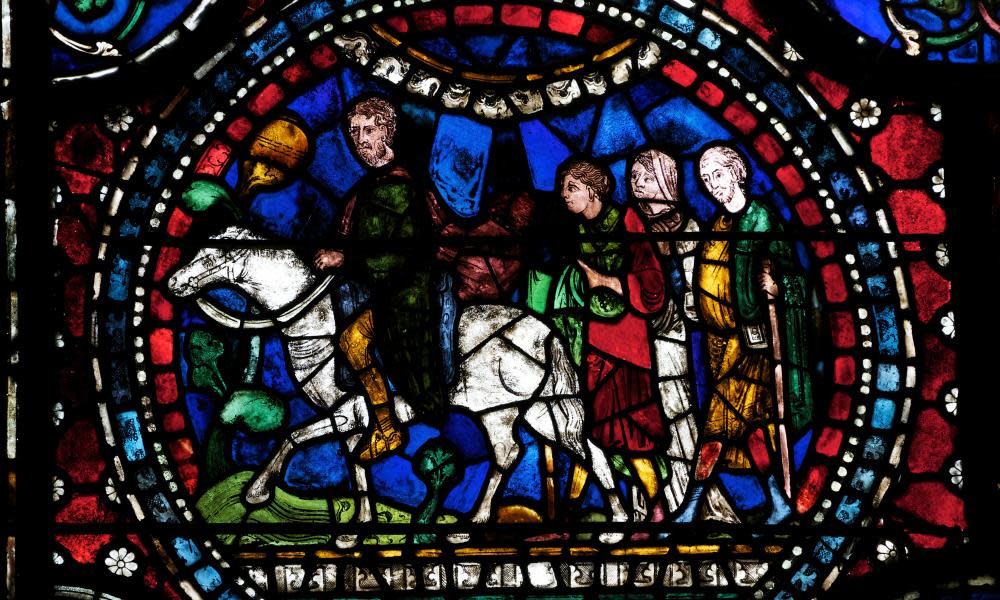Pilgrims by Matthew Kneale review – witty, thoughtful medieval tales

Twenty years after his bold and original novel English Passengers won the Whitbread prize, Matthew Kneale has returned to similar territory with Pilgrims, another polyphonic historical tale following a group of English men and women on a long journey into the unknown. His cast this time is a collection of 13th-century penitents travelling to Rome to seek absolution for a colourful variety of sins. Though Kneale’s pilgrimage is set in 1289, a century before The Canterbury Tales, it’s impossible not to have Chaucer’s bawdy band of storytellers in mind as you read. There’s more than a hint of the Wife of Bath about the cheerfully lustful and independent Lady Lucy de Bourne, who has accidentally killed one husband and aims to divorce the second in the papal court, while travelling with her child by another lover and accompanied by the man she hopes to wed next in Rome – though an author’s note at the end tells us that Lucy is one of the characters based on real historical figures. Another is Matilda Froome, a self-declared mystic from Norwich who has given birth to 18 children before deciding – understandably – that God is calling her to a life of celibacy. There’s the naive Tom son of Tom, a ragged idiot savant who is begging his way to Rome to save his dead cat from the fires of purgatory. Bellicose Sir John has been forced to do penance for punching an abbot, while two of the others – anxious widow Constance and Warin, a tailor with class grievances – are clearly being manipulated by family members who fancied a trip at their expense.
The comedy lies in the gulf between a character’s view of him or herself and the way they are perceived by the others
The pilgrims present themselves in their own words; as with English Passengers, these accounts overlap and contradict one another, and much of the comedy lies in the gulf between a character’s view of him or herself and the way they are perceived by the others. For all the Chaucerian interludes – there’s an enjoyable episode where three male pilgrims are pounced on by eager nuns and caught with their breeches down – Kneale shows the oppressive weight of religious orthodoxy on ordinary people in ways both large and small. At every step, the pilgrims are fleeced by the church, all too often parting with coins to ward off further ill fortune or bribe God for favours. After Tom has spent the night praying for his cat at a shrine in Oxford, his aunt reprimands him for his meagre offering: “‘Mark my words, Saint Frideswide won’t be content with one little farthing.’ The canker man had given her tuppence ha’penny, she said, and even the demoniac gave tuppence. ‘And you know how saints get if they think themselves slighted.’” But Saint Frideswide’s avarice pales in comparison to the marketplace of indulgences they find when they reach Rome.
But if the Christians are exploited by the gatekeepers of their faith, the situation is significantly darker for England’s Jews. Kneale opens the novel with an incident that takes place in 1264, when two Jewish sisters, Motte and Rosa, narrowly avoid the massacre in London’s Jewry that kills their family. Twenty-five years later, Motte – now Mary – joins the pilgrimage to Rome, her new Christian identity a flimsy protection against the prejudice she is trying to outrun. There’s an undercurrent of casual antisemitism echoed unthinkingly by most of the characters, and the novel ends as it began, with a glimpse of further persecution of England’s Jews that casts a chill after the rumbustious rewards and comeuppances of the pilgrimage. Kneale doesn’t probe too deeply into the psychology of his medieval characters – perhaps to do so would have felt anachronistic – but he captures an ingrained sense of English, Christian superiority over those who are not considered to truly belong that feels all too uneasily familiar.
• Pilgrims by Matthew Kneale is published by Atlantic (£16.99). To order a copy go to guardianbookshop.com. Free UK p&p over £15


